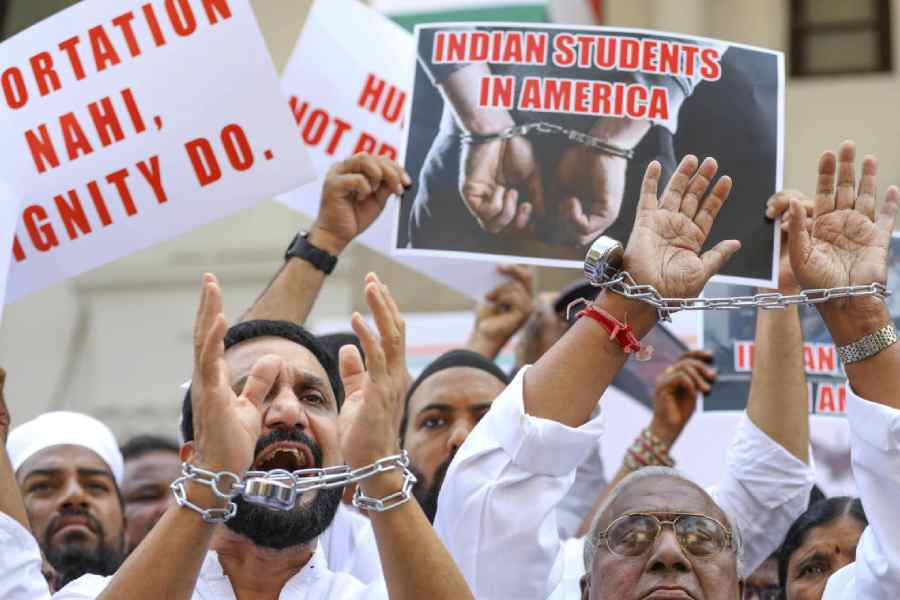The deportation of 104 illegal Indian migrants from the US this week was a “significantly different type of operation” from previous removal flights because of its characterisation as a “national security operation” by Washington, foreign secretary Vikram Misri said on Friday.
Echoing what external affairs minister S. Jaishankar had told Parliament on Thursday, he maintained that the use of restraints on deportees had been part of America’s standard operating procedure (SOP) since 2012.
Opposition parties had expressed outrage after the US Border Patrol chief posted a video on Thursday showing the Indian deportees being herded into a military aircraft handcuffed and with their feet chained.
Briefing journalists on Prime Minister Narendra Modi’s upcoming visit to France and the US, Misri faced a barrage of questions on the shackling of the deportees, on the use of a military aircraft for their deportation, and on India’s reaction to these measures.
Asked repeatedly whether India had protested the shackling of the deportees the way Mexico, Colombia and Brazil had, Misri said New Delhi had “registered our concerns” with the US authorities, adding that this was part of an ongoing conversation.
“We have always maintained that people should be treated properly,” he said.
Flagging the US government’s SOPs on the use of restraints on removal flights, he said: “If there are specific issues that are brought to our attention, we do make our concerns known to the US that this kind of treatment can perhaps be avoided.”
Misri sidestepped questions on whether India had considered sending an aircraft to bring back the verified Indians facing removal, and whether New Delhi’s muted response to the treatment of the deportees was linked to the Prime Minister’s US visit next week. Modi will be in the US on February 12 and 13.
Asked whether India considered the use of military aircraft for this purpose “dignified”, Misri sought to explain the circumstances.
“The nature of the flight on this occasion was determined by a significantly different type of operation — the characterisation by the United States as a national security operation,” he said.
“There was a request made that this would be the quickest way to do it but there are other types of flights that have taken place in the past and we remain open to all of these alternatives for the future.”
Misri said that in recent conversations, when the ministry had sought details about potential returnees from the US, India had been told there were up to 487 “presumed” Indian citizens with final removal orders from the US authorities. (India does not consider them Indian citizens till their bona fides are verified.)
Details of 298 of these individuals have been shared with the Indian government, Misri said.
“No details of others have been provided to us yet. There may well be more but I can give you numbers only once they are verified,” the foreign secretary said.
He rejected the US immigration and customs enforcement’s (ICE) characterisation of India as “uncooperative”.
In a November 2024 status report on “enforcement and removal operations”, ICE had placed India in a group of 15 countries that it described as “uncooperative” for their “lack of cooperation in accepting the return of their nationals”.
The list included Bhutan, China, Cuba, the Democratic Republic of the Congo, Eritrea, Ethiopia, Hong Kong, Iran, Laos, Myanmar, Pakistan, Russia, Somalia and Venezuela.
“We will not accept the description of India as an uncooperative country,” Misri said.
“Any country in the world, if it is going to accept its nationals back, will want to have the assurance that whosoever is coming back is a bona fide citizen. There are issues of legality associated with it; there are issues of security associated with it.”










